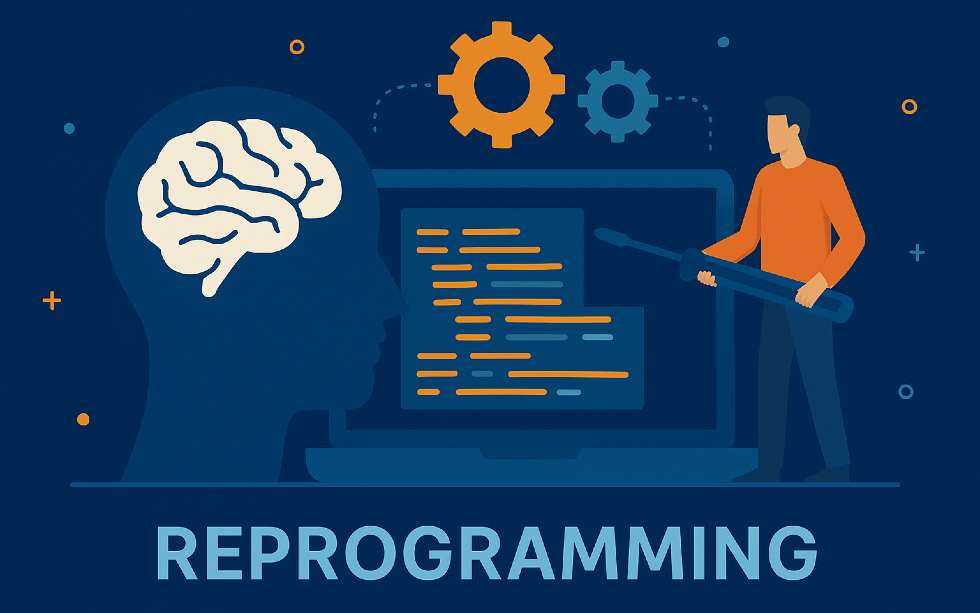How Do I Reprogram My Mind to Be Like Christ?
Do you struggle with negative thoughts that you know are holding you back? You want to change but don't see how you can. If so, here are two steps you can take.

Many Christians want to serve Christ but struggle to be consistent. They have the desire but wrestle with thoughts or habits that work contrary to the direction they want to go. This reminds me of my favorite scene from the 1993 Dennis the Menace movie.
Mr. Wilson (the classic grumpy neighbor) is throwing a big garden party at his house to witness the once-in-a-lifetime blooming of a “40-year orchid” in his garden. Dennis is sitting next to the man door of the garage and can see a button on the wall. He sits, fidgets, and wrings his hands and fingers. He does his best not to hit the button.
Of course, he can’t. He presses the button, only to discover too late that the door is swinging open and taking all of the food and ornate table settings to the ground. The horrifying scene ends as an ornately carved watermelon goes rolling down the driveway.

Here’s Why This Story Matters
I spent much of my life trying to figure out how not to push the button. I wanted to serve God, but I didn’t know how not to let the intrusive thoughts win—thoughts that were contrary to God’s will. Pathways in my mind that were the result of years of wrong thinking and giving into temptations had formed a wrong view of God. I thought that the most important thing was not pushing the button and gave no thought to discovering why I had a hard time not pushing the button in the first place.
To be clear, I am not just talking about outright sinful decisions. I’d given my life to Christ but was still fighting some strongholds of resistance. There were things in my life that I knew were not good for me, but I could not figure out how to get past them. To quote a line my dad often used, “I don’t know if it was taught, but it was caught.”
Growing up in church, I "caught" that peace with God was found in an emotional experience. Through hearing testimonies around me, I thought that if I cried enough during a service or gave up any number of unnamed, unknown things I was “holding back,” I would suddenly achieve a level of holiness akin to a state of nirvana. Everything would fall into place. I wouldn’t sin anymore, and I would be “perfect,” without fear, doubt, or uncertainty.
The problem was that when I didn’t “feel” God’s presence, there was nothing to steady my fidgeting hand, my uncontrolled tongue, and my wandering feet. I had “caught” something unbiblical and had never put in the work of spiritual disciplines to be renewed like Christ. I thought that practicing spiritual discipline was an attempt to earn salvation and, therefore, ungodly.
So in my spiritual pride, I continued to try and compete in a spiritual battle with no training and no practice. I had a view of God, what he wanted from me, and how our relationship was built. But my view was inherently wrong, so I pushed the button over and over again and watched all the beautiful fruits that God wanted in my life get thrown to the ground.
As Craig Groeschel writes, “Behavior modification doesn’t work, because the focus is only on modifying behavior. You don’t get to the root of the problem, which is the thought that produces the behavior. To be more specific, the problem is the neural pathway that leads to the behavior.”[1] Groeschel adds,
Thinking I can change a behavior just by removing the behavior is absurd. The behavior isn’t the root problem. The neural pathway that leads me to the behavior is the problem. If I stop a behavior, it will come back, unless I remove the lie at the root of the behavior, and replace the neural pathway that leads me to the behavior.[2]
So, What Can Be Done?
Through a lot of time and reflection, I realized there are two things we can do to attack this faulty thinking. As Ezra shared last week, the key starts with Romans 12, where Paul urges believers to be more like Christ by renewing their minds.
Practically speaking, this means we are to attack the fallen neural pathways we created in sin with new pathways rooted in Scripture. This is why, in Psalm 1, David likened a godly man to a tree that is planted right beside the water. Its roots go deep, and it is constantly fed. This takes work and intentionality, and the person who is like this doesn’t hang out in the council of the ungodly or sit in the seat of sinners. He or she cultivates friendships and council rooted in God’s Word to fight faulty thinking.
Second, we can create new pathways by putting the truth of God’s word and how he sees us into our minds. I used to have a mindset that said, what can I get by with and still be a Christian? I would justify entertainment that fit legalistic criteria but enjoyed a constant diet that was destroying any mind of Christ I was seeking to build.
The problem was I saw Christianity as a set of rules and God as the principal with a ruler waiting to smack me on the hand the moment I messed up. The fear of the ruler wasn’t enough to alter the pathways of sinful thinking I had created. I had to create new pathways—a process that continues to this day.
So, where are you at today? What new pathways do you need to create? Remember that God wants you to have the mind of Christ. And you will discover this in the steady plod and the daily rededication of your life to him. So keep studying his word, keep being transformed, and keep leaning into Godly friends. Little by little, you will form new pathways in your brain.
[1] Craig Groeschel, Winning the War in Your Mind: Change Your Thinking, Change Your Life (Nashville: Function, 2021), 84.
[2] Craig Groeschel, Winning the War in Your Mind: Change Your Thinking, Change Your Life (Nashville: Function, 2021), 85.





